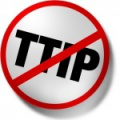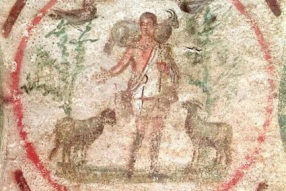Storm in a Tea Tip? - Understanding the proposed TTIP treaty

What is the TTIP? John Nightingale, Chairman of Jubilee Debt Campaign, Birmingham explains:
“Tea-Tip” is the pronunciation used for TTIP, the initial letters of the “Transatlantic Trade and Investment Partnership”. This is the proposed treaty between the USA and the European Union, to be completed before the run up to the US Presidential elections in 2016.
Though the TTIP negotiations have been going on for some time, many people have yet to hear of them. One of the reasons is that they have been conducted behind closed doors, on the grounds that the positions of both sides are confidential – as in a business negotiation between two firms. However, if the public on both sides of the Atlantic are interested parties, then it is surely important that as much information should be available as possible.
The main reason given for TTIP is the advisability of reducing tariffs and harmonising standards. Other things being equal, tariff reduction is usually a good thing, though at the moment the average tariff on both sides is on less than three percent. Then certainly some standards could benefit from being harmonised, for example those concerned with the colour of car indicator lights or the sizes of garments. However the worry is that, if an existing treaty of this sort, the TPP or Trans-Pacific Partnership, is anything to go by, the advantages will principally accrue to multi-national companies over against consumers or local producers.
HARMONISING STANDARDS
The danger here is that there may be a “race to the bottom”. On the one hand the UK may have to adopt inferior US standards, for example in food production, such as US poultry washed in chlorine or containing genetically modified material. On the other hand the US may have to adopt the less stringent UK regulation of financial services; there is currently, I am told, much more concern about this in France and German than in the UK, where there is an active firm of lobbyists “City UK” which lives up to its name. Deregulation is of particular concern to Jubilee Debt Campaign which traces the problems of international debt in large measure to the financial liberalisation that started in the 1970s and 1980s.
PUBLIC SERVICES
The weakening of regulations is likely to lead to increasing competition in education in health. For example UK and US educational institutions will be able to compete on one another’s home turf. That is not necessarily a bad thing but it could well be coupled with inducements to privatisation, with the rider that, once privatisation had occurred, it would be impossible to reverse the process. I am glad to say that the House of Commons is in a few days to debate a motion to exclude the NHS from TTIP, for now there is a window in which national governments can insist on exclusions; so far only the French have done this, for their own film industry.
THE ENVIRONMENT
The free flow of energy across the Atlantic could have the advantage of making Europe less dependent on oil from Russia or the Middle East. However it is likely to lead to the increased production of fracked oils and gas, at least from the US, which is very serious. Instead we need more use of renewable energy, with any fuel subsidies directed to that end.
SETTLING DISPUTES
Under TTIP it looks as if the settlement of disputes will be taken away from national courts, as at present, and put into the hands of ISDS, the Investor-State Dispute Mechanism – secretive tribunals of experts in commercial law whose decisions will not be subject to appeal. Such a process is likely to make it easier for firms to take action against governments if they think that their profits have been harmed by government action; current examples are Philip Morris currently suing the governments of Uruguay and Australia for putting health warnings and plain packaging on cigarette packages, and the government of Quebec being taken to court, by a Canadian company based in the US, for stopping its fracking.
DATA PROTECTION, COPYRIGHT AND PATENTS
On past experience it is feared that multinational firms will press for the maximum protection for their own data, copyright and patents, and as far as possible reduce access to others, especially consumers and independent producers.
THE WAY FORWARD
What is the way forward? TTIP needs to be scrutinised and, unless these legitimate questions are addressed, rejected. There is indeed an alternative model worth comparison, the Alternative Trade Mandate, which is being promoted by campaigners in Europe; it is intended to promote alliances between producers and consumers (especially small businesses) to further organic, environmentally-friendly and ethical means of production, trade and investment.
I am struck by the words of Jesus: ‘In the evening you say, “It will be fine; there is a red sky”, and in the morning, “Stormy weather today; the sky is red and overcast”. You know how to read the face of the sky, but you cannot read the signs of the times’ (Mt 16: 2-3 Jerusalem Bible).
John Nightingale
johnnightingale@btinternet.com
Further information can be obtained from the following websites:


















